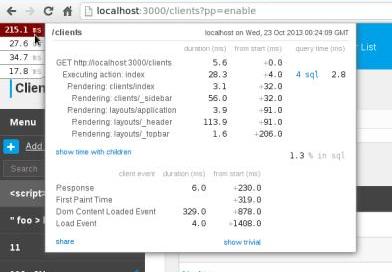Ruby Coding Convention (Phần 2)
January 22, 2014
Trong phần trước, tôi đã giới thiệu Source Code Layout của Ruby, làm sao để source code dễ nhìn, dễ đọc hơn. Trong phần này, tối sẽ tiếp tục giới thiệu những phần tiếp theo về Ruby Coding Convention, dựa theo bài viết của tác giả Bbatsov tại https://github.com/bbatsov/ruby-style-guide#syntax.
Syntax
- Khi định nghĩa function, nếu có tham biến truyền, sử dụng các dấu
(). Nếu không có tham biến, bạn không nên có nó# bad def some_method() # body omitted end # good def some_method # body omitted end # bad def some_method_with_arguments arg1, arg2 # body omitted end # good def some_method_with_arguments(arg1, arg2) # body omitted end - Sử dụng
?:thay vì dùngif/then/else/endnếu điều kiện đơn giản. Nhưng nếu có 2 câu lệnh lồng nhau, thì nên đan xen 2 kiểu đó như ví dụ ở dưới# bad result = if some_condition then something else something_else end # good result = some_condition ? something : something_else # bad some_condition ? (nested_condition ? nested_something : nested_something_else) : something_else # good if some_condition nested_condition ? nested_something : nested_something_else else something_else end - Sử dụng
!thay chonot,&&thay choand,||thay choor - Không nên sử dụng
if/unless .. end,while/until ... endnếu statement chỉ có một dòng. Ví dụ# bad if some_condition do_something end # good do_something if some_condition # bad while some_condition do_something end # good do_something while some_condition - Sử dụng
unlessthay choif not - Không sử dụng
unless ... else ... end. Hãy viết lại thành câu lệnhif ... else ... end - Hạn chế sử dụng
()trong câu lệnhif/unless/while/until# bad if (x > 10) # body omitted end # good if x > 10 # body omitted end
- sử dụng
untilthay chowhilevới câu lệnh dạng phủ định# bad do_something while !some_condition # good do_something until some_condition
- Bỏ các dấu
{}ngoài cùng của hash# bad user.set({ name: 'John', age: 45, permissions: { read: true } }) # good user.set(name: 'John', age: 45, permissions: { read: true }) - Khi gọi method không có arguments đi dùng, hãy bỏ các dấu ngoặc
# bad Kernel.exit!() 2.even?() fork() 'test'.upcase() # good Kernel.exit! 2.even? fork 'test'.upcase
- Đối với những đoạn code chỉ đơn giản, chỉ gồm 1 dòng, hãy sử dụng
{...}do ... end# bad names.each do |name| puts name end # good names.each { |name| puts name } - Không phải lúc nào cũng cần sử dụng
return. Hạn chế sử dụng nếu flow của source code không cần thiết nó# bad def some_method(some_arr) return some_arr.size end # good def some_method(some_arr) some_arr.size end
- Tránh sử dụng
selfnếu không cần thiết. Nó chỉ cần sử dụng nếu bạn muốn ghi dữ liệu# bad def ready? if self.last_reviewed_at > self.last_updated_at self.worker.update(self.content, self.options) self.status = :in_progress end self.status == :verified end # good def ready? if last_reviewed_at > last_updated_at worker.update(content, options) self.status = :in_progress end status == :verified end - Không gán biến trong câu lệnh
if ... else ... end# bad (+ a warning) if v = array.grep(/foo/) do_something(v) ... end # good v = array.grep(/foo/) if v do_something(v) ... end - Khai báo biến bẳng kí hiệu
||=. Tuy nhiên, không gán theo cách này với biến boolean# gán giá trị Bozhidar cho biến name nếu biến này là nil hay false name ||= 'Bozhidar' # bad enabled ||= true # good enabled = true if enabled.nil?
- Sử dụng
&&=để xử lý biến nếu cần điều kiện khi biến tồn tại. Việc sử dụng kí tự này sẽ không cần kiểm tra xem biến có tồn tại hay k# bad if something something = something.downcase end # good something &&= something.downcase
- Không được có dấu cách sau tên hàm và trước dấu
(# bad f (3 + 2) + 1 # good f(3 + 2) + 1
- Sử dụng
-wđể trình biên dịch Ruby nhắc bạn nếu bạn quên đi những qui tắc ở trên - Các sử dụng
lambda# good l = ->(a, b) { a + b } l.call(1, 2) l = lambda do |a, b| tmp = a * 7 tmp * b / 50 end - Sử dụng
procthay choProc.new,proc.call()thay choproc[]hayproc.() - Sử dụng kí tự
_đối với những biến không sử dụng trong block# bad result = hash.map { |k, v| v + 1 } # good result = hash.map { |_, v| v + 1 } - Sử dụng
betweenhoặcincludethay vì sử kiểm tra toán tử login thông thường# bad do_something if x >= 1000 && x <= 2000 # good do_something if (1000..2000).include?(x) # good do_something if x.between?(1000, 2000)
- Sử dung những phương thức đã được Ruby định nghĩa sẵn thay vì sử dụng
==# bad if x % 2 == 0 end if x % 2 == 1 end if x == nil end # good if x.even? end if x.odd? end if x.nil? end if x.zero? end if x == 0 end
- Hạn chế sử dụng các câu lệnh điều kiện lồng nhau. Việc đó làm cho login của source code rất khó theo dõi. Thay vào đó, bạn có thể sử dụng
returnkhi có thể để giảm số lớp câu điều kiện# bad def compute_thing(thing) if thing[:foo] update_with_bar(thing) if thing[:foo][:bar] partial_compute(thing) else re_compute(thing) end end end # good def compute_thing(thing) return unless thing[:foo] update_with_bar(thing[:foo]) return re_compute(thing) unless thing[:foo][:bar] partial_compute(thing) end




